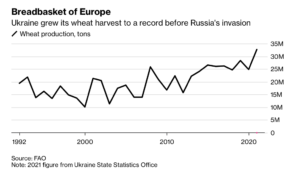Bloomberg's Hallie Gu reported that "China’s grain supply won’t be affected by a loss of US feed grain and oilseed imports, thanks to abundantly available substitutes on the global market…
Ukraine Production “More Critical” Amid Food Security Concerns
Bloomberg writers Aine Quinn and Volodymyr Verbyany reported today that, “Ukraine is the world’s largest producer of sunflower oil and ranks among the top six exporters of wheat, corn, chicken and even honey. The money it earns from agriculture — $28 billion last year — is now more vital because of the war effort, and the produce more critical for a world where record prices are raising concerns about food security.
“Egypt and Turkey, which rely on Russian and Ukrainian grain, are grappling with skyrocketing inflation. The government in Cairo is considering raising the price of subsidized bread for the first time in four decades. Shortages of sunflower oil in Europe, meanwhile, are forcing suppliers to seek alternatives. Supermarkets across the U.K. are limiting how much cooking oil customers can buy.
“That, in turn, is sending vegetable oil prices soaring as far away as India, where street vendors are steaming food instead of frying it. There’s also increased demand for palm oil, which has been blamed for causing deforestation.”

The Bloomberg article noted that, “Ukrainian President Volodymyr Zelenskiy has said Russia, itself a key agricultural exporter, is deliberately targeting farmland, placing landmines in fields and destroying equipment and storage facilities. Those claims were supported by European Union Commissioner Janusz Wojciechowski, who said the bloc would seek to aid Ukraine’s farmers.
“Not only is the country increasingly unable to export because transit routes have been severed, but Ukraine needs to keep its more limited supplies of produce to ensure its survival, Ukraine’s agriculture minister said last month.
The Russian military has consistently said it’s not targeting civilian facilities, despite widespread evidence to the contrary. Its limited pullback from Kyiv means that farmers can plant in previously occupied areas like Chernihiv, but harvests of some of Ukraine’s most important crops could still be cut in half this year.
Quinn and Verbyany stated that, “For now, only small amounts of grain and other products are being transported out by rail after Russia blocked Ukraine’s Black Sea ports and shelled vital infrastructure. Ukraine is asking for Europe to provide river barges and trucks to keep the reduced exports flowing.”
The Bloomberg article added that, “Meanwhile, Russia is still exporting grain to some of its biggest customers, even as shipping costs soar and some traders seek to avoid Russian commodities. It may even get some new business. Israel, which often buys from Ukraine, bought some Russian wheat last month, according to Geneva-based crop data company Agflow.

“In Europe, farmers used to moan about Ukraine’s cheaper food imports coming into the market. The EU is now delaying rules intended to make farming more green, including pushing back planned curbs on pesticide use. It’s also planning to free up almost 4 million hectares of fallow land to plant more cash crops.”
Reuters writer Pavel Polityuk reported last week that, “Ukraine has sown 1.54 million hectares of spring grains as of April 21, or 20.7% of the expected area, the agriculture ministry data showed on Friday.
The data showed that farmers had sown 164,400 hectares of spring wheat, 802,200 hectares of spring barley, 107,200 hectares of peas, 127,400 hectares of oats, 323,300 hectares and some acreage of other commodities.
Meanwhile, a separate Reuters article by Pavel Polityuk late last week reported that, “Ukraine’s state-owned railway company has extended temporary restrictions on the transportation of some agricultural goods over the border to Poland, analysts and officials said on Friday.
“Ukraine, a major agricultural producer, used to export most of its goods through seaports but since Russia’s invasion in February has been forced to export by train via its western border.
Russian military says its new goals include "control over southern Ukraine" & "access to Transnistria, where there's also persecution of the Russian-speaking population."
— Alec Luhn (@ASLuhn) April 22, 2022
Which paints a big target on Mykolaiv & Odesa... https://t.co/5JerpVITdM pic.twitter.com/jXVmGqJeNA
“APK-Inform consultancy said restrictions on the movement of goods to Poland through Izov would be extended to May 3, but did not give details.”





